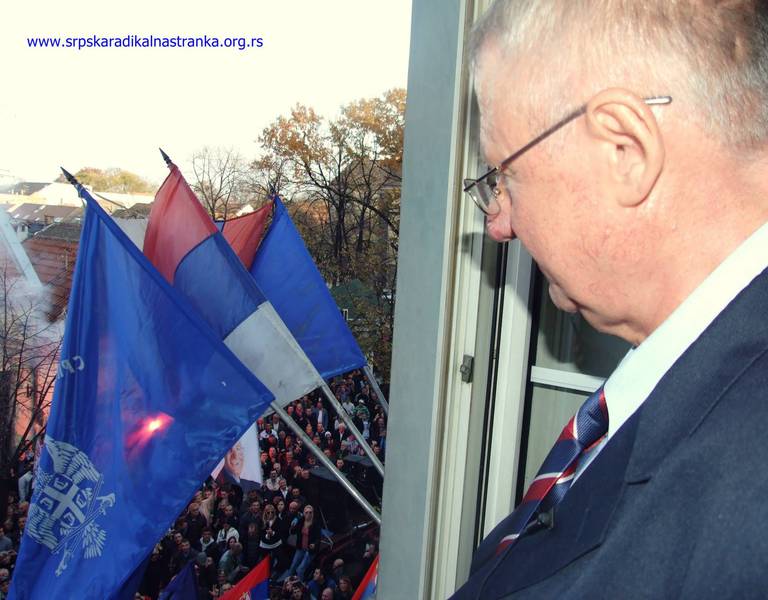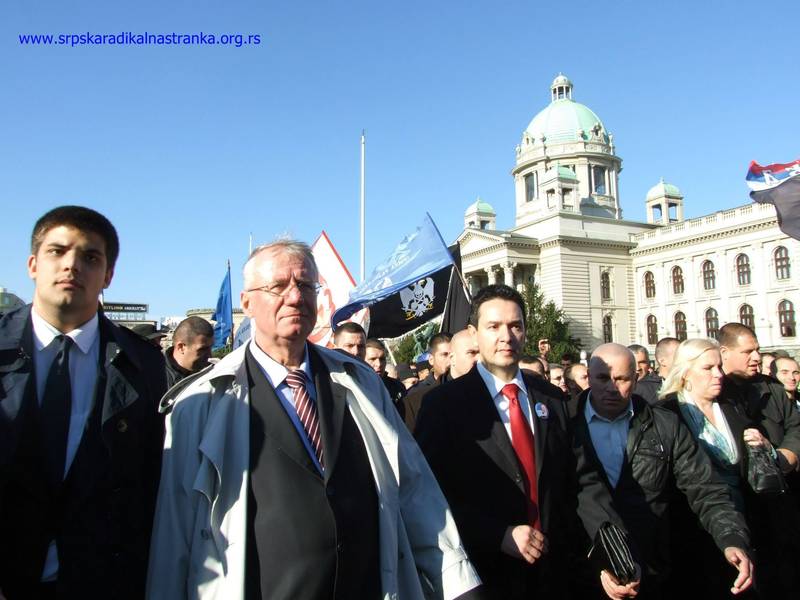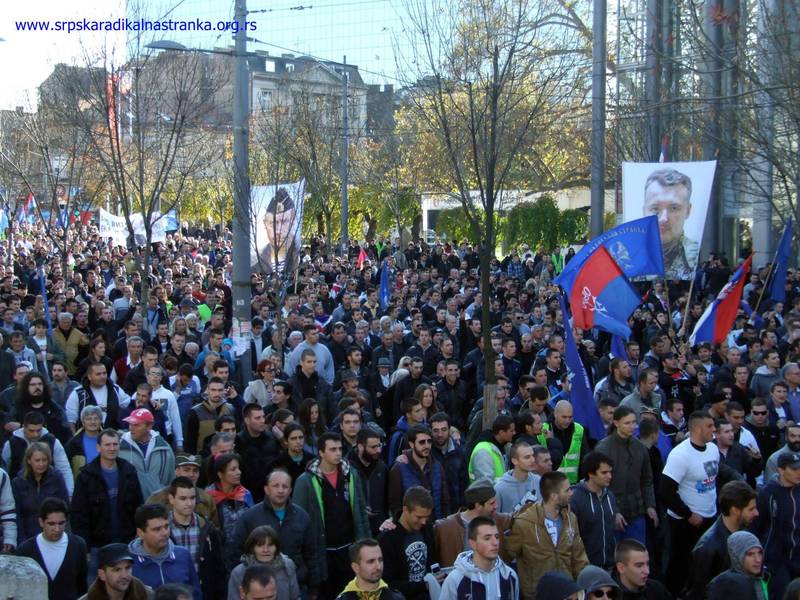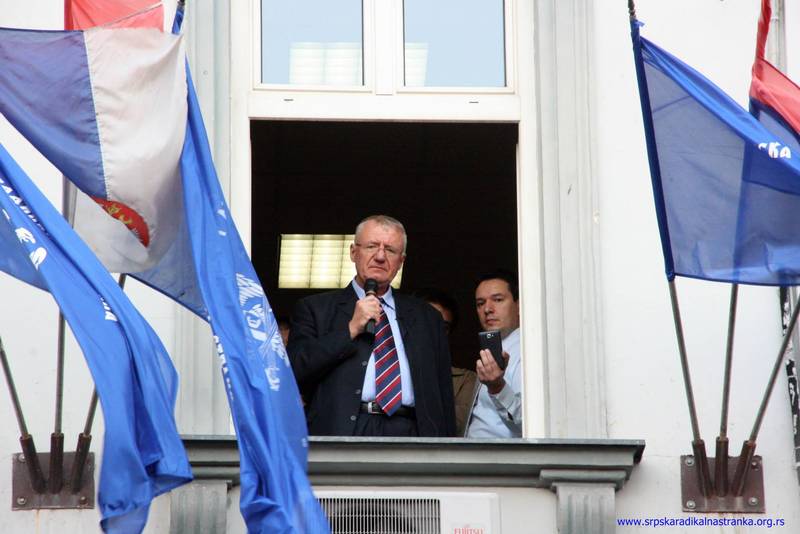Serbian Authorities' Silence on Seselj Is a Mistake
Adelina Marini, November 20, 2014
 It would be wiser if, instead of calling Croatia's reactions against Vojislav Seselj's return to Serbia "daily politics", Serbian Prime Minster Alexander Vucic condemned Seselj's statements. Condemnation is also needed by President Tomislav Nikolic and Deputy Prime Minster and Minster of Foreign Affairs Ivica Dacic to prove that membership in the EU is Serbia's strategic goal not only in words. Why? Because the EU is a symbol of reconciliation. In 2012, the Union received the Nobel Peace Prize because of "the successful struggle for peace and reconciliation and for democracy and human rights", as read the statement of the Nobel committee. "The work of the EU represents 'fraternity between nations' and amounts to a form of the 'peace congresses' cited by Alfred Nobel as criteria for the Peace Prize in his 1895 will", is said in the motives of the committee.
It would be wiser if, instead of calling Croatia's reactions against Vojislav Seselj's return to Serbia "daily politics", Serbian Prime Minster Alexander Vucic condemned Seselj's statements. Condemnation is also needed by President Tomislav Nikolic and Deputy Prime Minster and Minster of Foreign Affairs Ivica Dacic to prove that membership in the EU is Serbia's strategic goal not only in words. Why? Because the EU is a symbol of reconciliation. In 2012, the Union received the Nobel Peace Prize because of "the successful struggle for peace and reconciliation and for democracy and human rights", as read the statement of the Nobel committee. "The work of the EU represents 'fraternity between nations' and amounts to a form of the 'peace congresses' cited by Alfred Nobel as criteria for the Peace Prize in his 1895 will", is said in the motives of the committee.
One of the toughest criticism against the EU receiving the prize was that the Union failed to prevent the wars that accompanied the breakup of former Yugoslavia. The most severe this criticism was in the region of ex-Yugoslavia. However, the EU cannot do all the work on its own. The countries from the region need to cooperate. That is why it is very important those who are on the path of European integration do their utmost to prove that they are worthy of membership in a Union which symbolises peace and reconciliation. And that means that they are ready to face their past and condemn the crimes perpetrated back then.
Is Serbia worthy?
In the past months, Serbia has been facing severe challenges. Its path to the EU will prove the most difficult precisely because of unresolved problems from the past. Serbia has shown vicinity to Russia which is unacceptable in EU and especially in its eastern part at a time when the country is turning into the threat it was at the time of the Cold war. Therefore, such intimacy comes into direct contradiction with everything the EU embodies. Although the Union firmly states that it does not demand of Serbia to give up its friendship or even fraternity with Russia as a precondition for European integration, but the conflict between the two principles is evident and Serbia feels it painfully. The second big challenge is the odd decision of the International Crimes Tribunal for former Yugoslavia in the Hague, set up by the UN to pursue war crimes perpetrated during the wars in the region in the beginning of the 1990s. And all this against the backdrop of the failure of the attempt for reconciliation with Albania.
On 6 November, the tribunal decided to set Vojislav Seselj free on humane grounds because of his deteriorated health. Seselj was returned to Belgrade on 12 November after a record long stay in the tribunal's arrest. He was transferred to the Hague on 24 February 2003. The charges against him are grave - murder, torture, cruelty, wanton destruction of villages, devastation. On the list of charges are also the killing of many Croats, Muslims and other non-Serb civilians, including women and elderly persons in Vukovar in Croatia and Zvornik, Greater Sarajevo, Mostar and Nevesinje in Bosnia and Herzegovina. Among the charges are also prolonged and routine detention of Croats, Muslims and other non-Serb civilians in camps in Croatia and Bosnia and Herzegovina.
Although he was set free due to a disease (he suffers from colon cancer in, it is claimed, fatal phase), Seselj announced yet during his flight to Belgrade that he will dedicate himself to politics and medical treatment will be left for later. His main goal is to take revenge from Alexander Vucic (currently prime minister of Serbia) and Tomislav Nikolic (president), who were in the past leading figures in the Serbian Radical Party (CPC), founded in 1991 by Vojislav Seselj. Ever since he returned to Serbia, Seselj has not stopped sowing hatred.
 His return to Serbia happened just days before the anniversary of the fall of Vukovar which is a very important date for the Croats which is well argued for in the charges against Seselj. He did not miss that chance and on 18 November his party published a special statement which caused outrage in Croatia but no reaction in Belgrade or Brussels. "The President of the Serbian Radical Party, Professor Doctor Vojislav Seselj, congratulated the Serb guerrillas [chetniks] with the day of liberation of Serbian Vukovar. 23 years ago today, the Serbian chetniks liberated Vukovar from the ustash paramilitary units after three-months long brave battles. Serbian Vukovar was the first liberated Serbian city which, without a fight, with the help of the regime in Belgrade, was transferred to the ustash Croatian state. Doctor Vojislav Seselj and his Serbian Radical Party will never give up on the unity of the Serbian state and will do everything possible the republic of Srpska Krajina and Serbian Vukovar to be again part of Great Serbia".
His return to Serbia happened just days before the anniversary of the fall of Vukovar which is a very important date for the Croats which is well argued for in the charges against Seselj. He did not miss that chance and on 18 November his party published a special statement which caused outrage in Croatia but no reaction in Belgrade or Brussels. "The President of the Serbian Radical Party, Professor Doctor Vojislav Seselj, congratulated the Serb guerrillas [chetniks] with the day of liberation of Serbian Vukovar. 23 years ago today, the Serbian chetniks liberated Vukovar from the ustash paramilitary units after three-months long brave battles. Serbian Vukovar was the first liberated Serbian city which, without a fight, with the help of the regime in Belgrade, was transferred to the ustash Croatian state. Doctor Vojislav Seselj and his Serbian Radical Party will never give up on the unity of the Serbian state and will do everything possible the republic of Srpska Krajina and Serbian Vukovar to be again part of Great Serbia".
There is no way in such a situation one not to remember the scandal which caused Tomislav Nikolic around his elections when in an interview he also called Vukovar a Serbian city. The Croatian First Deputy Prime Minister and Minister for Foreign and European Affairs believes that Seselj's behaviour has a negative impact on the process of European integration in the region and especially in Serbia. In an interview with this website, Vesna Pusic expressed "condolences" to the Serbian authorities because, according to her, Serbia has nothing to do with Seselj's setting free. "I certainly wouldn't like to be in their shoes and have that type of person running around in my country or in anybody else's country. It's certainly not good". She was interviewed by euinside on Friday. Since then, however, the Serbian state elite have behaved as if nothing happened. They refuse to comment as Prime Minister Vucic afforded himself to only say that he sincerely wished Seselj good health whereas Deputy Prime Minister Dacic called him "a very sick man". In an interview on Tuesday evening for the Serbian state-owned television, Alexander Vucic said that he neither wants nor he can say anything bad about Seselj, "because this means to say bad things about myself too, but we differ in terms of policies", he said. We should look into the future and not deal with the past, was his message.
However, the building of bright future passes through coming to terms with the past. And this requires Serbia to be aware of its own past and condemn the crimes of the previous regime. The first step was made during the Croatia Forum in Dubrovnik this summer, but it is obvious that this is not enough, especially when the Serbian government repeats tirelessly several times a day that the EU is its strategic goal. Moreover, Deputy Prime Minister Dacic said in Brussels on 18 November after a meeting with the Commissioner for Enlargement Negotiations, that the EU is not a goal but a path, which means that "we have to create a society with the same values and to do this for us not for EU accession". One of the conditions in the European integration process of the countries from the Western Balkans is reconciliation. In the EU enlargement strategy for 2015, presented in October, the Commission reports  that one of the biggest challenges the countries from the region are facing is overcoming the legacy of the past.
that one of the biggest challenges the countries from the region are facing is overcoming the legacy of the past.
It will not be overcome by passing over in silence. Seselj is a reality that cannot be ignored or downsized to "daily politics", obviously hinting of the election campaign which is in its peak for the presidential elections in Croatia in the end of the year. This reality brings up the issue about the role and benefit of the Tribunal for the reconciliation in the Balkans but also about Serbia's readiness to become part of the EU. The silence of the Serbian elite is especially tangible around the anniversary of Vukovar. Condemning Seselj will not abolish nor will it diminish the importance of resolving bilateral issues in the region, nor does it lower the responsibilities for the war crimes. It is a sign, though, that Serbia is mature enough to face its future and be a member of the EU tantamount to its legacy as an organisation of countries who have overcome two devastating world wars in the beginning of the 20th century and which has become one of the most influential powers in the world. Moreover, this should be done also because, as Vesna Pusic explained, Vojislav Seselj's current rhetoric is the same as the one that led to the wars from the 1990s.
With all its flaws and mistakes, the EU, indeed, is a path, as Dacic says, toward peaceful and jointly existence ensured through dialogue and reconciliation. Every second of silence injects a new dose of doubt whether Serbia is ready for the EU. It will be as wise, however, if the Union itself took a strong position against Seselj's statements and Serbia's silence because Vesna Pusic is right when saying that this directly strikes at heart of the European integration process in the region and damages the positive changes stemming from precisely this process. There is another reason why the EU should take a firm stance and it is the Russian factor of which spoke Predrag Simic, professor at the Belgrade Department for Political Science, in an interview with the Serbian Blic.
According to him, the way the Russian state-owned television reported on Seselj's return, describing him as a "tireless patriot", reaffirms Moscow's position on Serbia from the 1990s when it confronted the West. "Russia supports the current power in Belgrade but it sends a message that it has an alternative in case someone from the current establishment decided to get closer to the West", Mr Simic believes. This is not a position to walk on by against the backdrop of what Croatia's Deputy Prime Minister Vesna Pusic said these days that for the first time since 2005 Russia demanded from the annual UN resolution on Bosnia and Herzegovina the sentence about the country's Euro-Atlantic perspective, and of the whole region for that matter, to be removed.
 Johannes Hahn, the EU commissioner for enlargement negotiations, said after meeting Ivica Dacic on Tuesday that Serbia is a sovereign state and he cannot ask of it to impose sanctions on Russia. Dacic, for his part, assured that Serbia knows its obligations very well: continue with the domestic reforms, the dialogue with Pristina and gradually harmonise its foreign policy with that of the EU. In this regard, Ms Pusic is right that not only the EU but the creator of the Hague tribunal - the UN - should react against Seselj's statements and to undertake measures that he is sent back to prison until the final sentence is announced. Otherwise, the progress that has been achieved so painfully for reconciliation in the region and its getting closer to the EU will be dashed out 25 years after the fall of the Berlin wall which was supposed to bring peace and unification. If Serbia has to prove it is ready for the EU, the Union, for its part, needs to prove that the criticism against it on the occasion of the Nobel Peace Prize is not justified.
Johannes Hahn, the EU commissioner for enlargement negotiations, said after meeting Ivica Dacic on Tuesday that Serbia is a sovereign state and he cannot ask of it to impose sanctions on Russia. Dacic, for his part, assured that Serbia knows its obligations very well: continue with the domestic reforms, the dialogue with Pristina and gradually harmonise its foreign policy with that of the EU. In this regard, Ms Pusic is right that not only the EU but the creator of the Hague tribunal - the UN - should react against Seselj's statements and to undertake measures that he is sent back to prison until the final sentence is announced. Otherwise, the progress that has been achieved so painfully for reconciliation in the region and its getting closer to the EU will be dashed out 25 years after the fall of the Berlin wall which was supposed to bring peace and unification. If Serbia has to prove it is ready for the EU, the Union, for its part, needs to prove that the criticism against it on the occasion of the Nobel Peace Prize is not justified.
 Bakir Izetbegovic, Andrej Plenkovic | © Council of the EU
Bakir Izetbegovic, Andrej Plenkovic | © Council of the EU Aleksandar Vucic, Recep Tayyip Erdogan | © Serbian Presidency
Aleksandar Vucic, Recep Tayyip Erdogan | © Serbian Presidency Jean-Claude Juncker, Zoran Zaev | © European Commission
Jean-Claude Juncker, Zoran Zaev | © European Commission